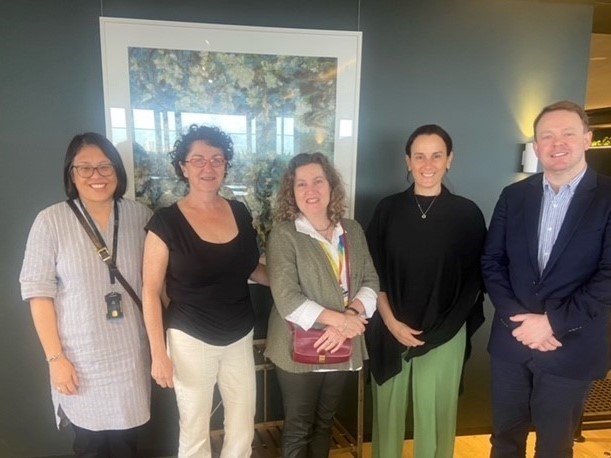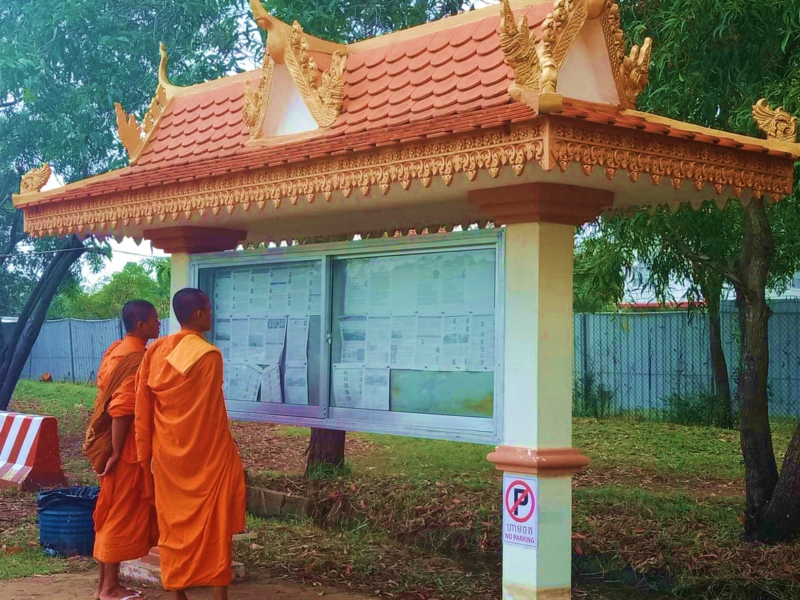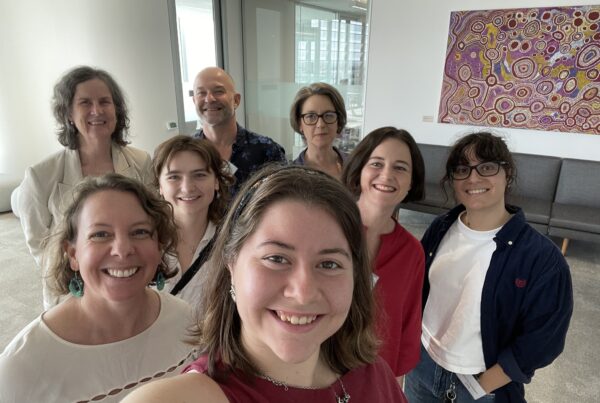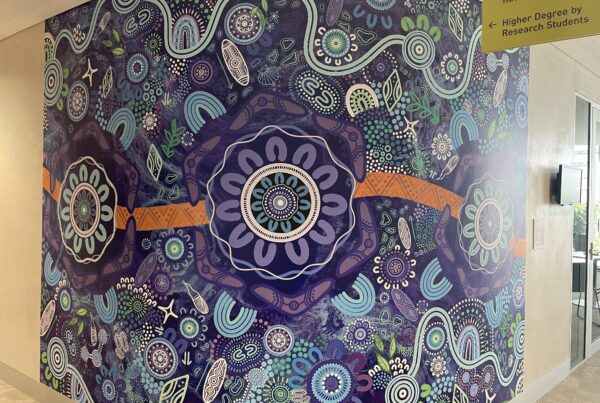Editor’s note: The convenors of the Law and Linguistics Interdisciplinary Researchers’ Network (LLIRN), Dr Alex Grey and Dr Laura Smith-Khan, have started this new LLIRN About Us blog series to help a wide readership learn about the research, expertise and goals of the network’s members. In this second post in the new series, you can learn (or “LLIRN”) more about nine network’s members’ work on multilingualism in courts and tribunals. In a great display of networking, six of the nine already collaborate together, and we hope these profiles help more collaborators find each other.
***
Laura Smith-Khan and Alex Grey
***
Dr Jinhyun Cho
Dr Jinhyun Cho has investigated interplays between monolingualism and multilingual practices in courtrooms, with a focus on interpreters. Focusing on linguistic, institutional and cultural hierarchies in Australian legal spaces, Dr Jinhyun Cho’s work has revealed how power differentials influence the choices that legal interpreters make in the course of interpreting and drawn attention to the need for legal professionals to enhance their awareness of interpreting through the formalisation of multilingualism within university-level studies of law. She is based at Macquarie University in Australia.
Her 2024 collaborative work on the Khmer Rouge Tribunal (the ECCC) represents her broad interdisciplinary approach which brings together interpreting, sociolinguistics and law.
Recent publications
Killean, R., Grey, R., Cho, J., & Stern, L. (2024). Translating atrocity at the Khmer Rouge Tribunal. New Mandala.
Cho, J. (2021). Intercultural communication in interpreting: Power and choices. Routledge.
Cho, J. (2021). ‘That’s not how we speak’: interpreting monolingual ideologies in courtrooms. Griffith Law Review, 30(1), 50-70.

Research project team (L-R): Dr Julie Lim, Professor Ludmila Stern, Professor Sandra Hale, Associate Professor Melanie Schwartz and Professor Stephen Doherty, April 2024
Professor Sandra Hale
In addition to her role in the project led by Ludmila Stern described below, Sandra Hale and another team at the University of New South Wales in Australia (Prof Jane Goodman-Delahunty, Dr Natalie Martschuk and Dr Susan Brandon) have been working since 2020 on a project funded by the United States’ Federal Bureau of Investigation entitled ‘Remote simultaneous interpreting in investigative interviews: The effect of language and interpreter training on deception detection, interpreting accuracy and witness credibility’. Keep an eye out for publications coming out of this project soon.
Recent publications
Hale, S., Martschuk, N., Goodman-Delahunty, J. & Lim, J. (30 Apr 2024): Juror perceptions in bilingual interpreted trials, Perspectives: Studies in Translation Theory and Practice.
Hale, S., Lim, J., Martschuk, N., & Goodman-Delahunty, J. (2023). Note-taking in court interpreting: Interpreter perceptions and practices in a simulated trial. The International Journal for Translation & Interpreting Research, pp.1-21.
Hale, S., Goodman-Delahunty, J., Martschuk, N., & Lim, J. (2022). Does interpreter location make a difference? A study of remote vs face-to-face interpreting in simulated police interviews. Interpreting: International Journal of Research and Practice in Interpreting, 24(2), pp.221-253.
Michael Jones
Michael Jones has been involved with the interpreting and translation profession for over 40 years and has worked as a NAATI accredited translator and interpreter between English and Italian, French, Portuguese and Spanish (NAATI is Australia’s National Accreditation Authority for Translators and Interpreters). He likes to call himself a language nerd. He has always been fascinated with languages since growing up in Sydney near two of the old migrant camps of the 1960s. He studied Linguistics at Sydney University in the 1970s.
As a lawyer specialising in immigration and citizenship law, Michael Jones also works extensively with interpreters and translators in courts, tribunals and other professional settings, and is happy to share his experiences and observations with others studying the field.
Dr Rachel Killean and Dr Rosemary Grey
In 2023, University of Sydney Law School researchers Rachel Killean and Rosemary Grey launched a new project ‘Translating Atrocity: Bridging language barriers in Cambodia’s war crimes tribunal.’ The project focuses on challenges of interpretation and translation arising in the United Nations-backed Extraordinary Chambers in the Court of Cambodia (ECCC) which works across the Khmer, English and French languages. Drawing on their original interviews with translators and interpreters who worked at the court, Rachel Killean and Rosemary Grey are identifying Khmer terms that have been difficult to translate into English and French and vice-versa; examining how translation challenges have been addressed; and assessing how translators and interpreters have affected the tribunal’s capacity to assess evidence and communicate effectively with the public. The findings have potential value for the functioning of other international tribunals, including the International Criminal Court in The Hague.

Members of the public arriving at the Extraordinary Chambers in the Courts of Cambodia to hear its main judgment (Image credit: Rosemary Grey, Phnom Penh, 2018
Rachel Killean and Rosemary Grey hope to continue collaborations with translation studies scholars, as well as interpreters/translators working in international criminal justice.
Recent publications
Killean, R., Grey, R. (2023). Interpretation and Translation in Atrocity Trials: Insights from the Khmer Rouge Tribunal. Cambridge International Law Journal, 12(2), 211-234.
Grey, R. (2022). Translating Gender Diversity in International Criminal Law: An Impossible but Necessary Goal. Australian Feminist Law Journal, 47(2), 163-186.
Killean, R., Grey, R., Cho, J. and Stern. L., ‘Translating atrocity at the Khmer Rouge Tribunal‘, New Mandala, 17 January 2024.
Grey, R. and Stern, L., ‘“Kadago’ in the Courtroom: Language Disputes in Atrocity Trials‘, Opinio Juris, 31 January 2024:
Dr Lucy Xin LIU
Dr Lucy Liu Xin’s research centres on the accuracy of Mandarin-English court interpreting and its implications for due process. She is particularly interested in exploring the interface between interpreting and pragmatics in legal settings. Her recent work explores the multimodal aspects of court interpreting, such as examining multimodal turn-taking strategies of court interpreters and utilizing acoustic tools for the analysis of courtroom discourse. She is based at Dalian University of Technology in China.
Recent publications
Liu, X., & Wang, C. (2023). How Does Interpreter’s Intonation Affect the Pragmatics of Courtroom Questions? A Case Study of Chinese-English Court Interpreting. In J. Zhao, D. Li, & V. L. C. Lei (Eds.), New Advances in Legal Translation and Interpreting (pp. 137-162). Singapore: Springer.
Liu, X. (2020). Pragmalinguistic challenges for trainee interpreters in achieving accuracy: An analysis of questions and their translation in five cross-examinations. Interpreting, 22(1), 87-116.
Stern, L., & Liu, X. (2020). Interpreting Studies. In S. Laviosa & M. González Davies (Eds.), The Routledge Handbook of Translation and Education (pp. 226-244). Oxfordshire: Routledge.
Stern, L., & Liu, X. (2019). Ensuring interpreting quality in legal and courtroom settings: Australian Language Service Providers’ perspectives on their role. The Journal of Specialised Translation(32), 90-120.
Stern, L., & Liu, X. (2019). See you in court: How do Australian institutions train legal interpreters? The Interpreter and Translator Trainer, 13(4), 361-389.
Dr Laura Smith-Khan
Laura Smith-Khan’s work explores how multilingualism is managed in and conceptualized by tribunals and courts in the context of assessing credibility in asylum applications in Australia. This was one focus of her doctoral research and has continued to be an area of interest in her more recent work.
She has also examined how migration lawyers and agents play a role in mediating multilingual communication in migration procedures, both at the initial application stage and at the tribunal, when an appeal is necessary. This work has led her to travel to Belgium in 2023 to spend time at Ghent University as a visiting scholar, and where she continues to have an external affiliation with UGhent’s Centre for the Social Study of Migration and Refugees. She has presented her research to judges and other decision-makers from Australia and internationally and it has also been cited in EU Agency for Asylum guidance on credibility and evidence assessment.
Recent publications
Smith-Khan, L. (forthcoming). Incredible language and refugee legal processes: Challenging asylum credibility assessments, in J Setter et al (eds), The Oxford Handbook of Language and Prejudice.
Maryns, K., Smith-Khan, L. & Jacobs, M. (2023). Multilingualism in asylum and migration procedures, in McKinney et al (eds), Routledge Handbook of Multilingualism, 2nd ed, Ch. 26.
Smith-Khan, L. (2023). Incorporating sociolinguistic perspectives in Australian refugee credibility assessments: The case of CRL18. Journal of International Migration and Integration, 24, 727-743 (invited contribution for special issue).
Smith-Khan, L. (2021). ‘I Try Not to Be Dominant, but I’m a Lawyer!’: Advisor Resources, Context and Refugee Credibility. Journal of Refugee Studies, 34(4), 3710-3733.
Smith-Khan, L. (2019). Why refugee visa credibility assessments lack credibility: A critical discourse analysis, Griffith Law Review, 28(4), 406-430.
Professor Ludmila Stern
Professor Ludmila Stern is leading a team including Professor Sandra Hale, Professor Stephen Doherty and Associate Professor Melanie Schwartz from the University of New South Wales in Australia and a number of partner organizations on the project, Access to justice in interpreted proceedings: The role of Judicial Officers, funded by an Australian Research Council Linkage Grant.
The research team is examining the ways judicial officers can improve courtroom communication and prevent miscommunication and error, particularly in criminal cases where speakers of ‘new and emerging’ and First Nations languages are involved, and where interpreters receive limited or no specialised training. Using an interdisciplinary approach that involves court observations, interviews with judicial officers and interpreters, and discourse analysis of court transcripts, the project aims to generate new knowledge about the variations in judicial officers’ communications practice when working with interpreters, and their impact on the effective transmission of information in the courtroom.
Having initially started in two international courts, the International Criminal Tribunal for the former Yugoslavia / International Residual Mechanism for Criminal Tribunals and the International Criminal Court, the project then focused on the way judges and magistrates work in interpreted proceedings in Australia courts, with field work now completed in the Australian jurisdictions of New South Wales, Victoria, Tasmania, Queensland, Western Australia and the Northern Territory.
Dr Xiaoyu Zhao
Dr Xiaoyu Zhao recently completed her PhD on interpreting studies at the University of New South Wales in Australia. Her PhD project investigated the impact of court-specific factors on Simultaneous Interpreting performance and explains these factors’ effects using Cognitive Load Theory. Her research has provided empirical evidence that enhances the understanding of the impact of task-, environment-, and interpreter-related factors on Simultaneous Interpreting performance in the court context. Additionally, it offers insights into interpreter training and professional practices that align with both national and international standards aimed at improving interpreters’ working conditions.
Dr Xiaoyu Zhao is currently working as an adjunct lecturer at Monash University in Australia and as a research fellow at the Monash Suzhou Research Institute in China. Her current research projects include a corpus analysis of interpreted texts in court settings and court interpreting pedagogy.
Recent publications
Zhao, X. (2023). A multidimensional investigation of cognitive load and performance over time during simultaneous interpreting between English and Mandarin Chinese [Doctoral dissertation, UNSW Syndey]. UNSWorks.
What about you?
Do you work or research in an area related to multilingualism in courts and tribunals, or another area where language and law intersect? Join the LLIRN!
What other language and law topics would you like to learn about? Have your say on our next “LLIRN About Us” blog post. Let us know in the comments or join the network and send us an email!
Upcoming Events
Multilingualism in courts and tribunals is the focus of two presentations scheduled within a themed session at the upcoming Australian Linguistic Society Conference (26-29 November at ANU). The session’s overall theme is ‘Law-and-Linguistics Research: Language, Diversity and Inclusion in Law’, and includes:
- Joseph van Buuren presenting new research on Australian criminal appeal judgements where applicants claim they have been denied rights or procedural fairness on the basis of language difference;
- Helen Fraser promoting inclusivity and justice in the use of language as forensic evidence by analysing the origins of linguistic ideologies and misconceptions in the law.






 This work is licensed under a
This work is licensed under a
fantastic research! What a great group of people. I wish I could come work with you and learn from you all.
Thanks, Martha, for your kind words! Joining the Law and Linguistics Interdisciplinary Research Network is actually easy 🙂
Just sign up here.
Thanks, Martha! As Ingrid said, you are very welcome to join our network!